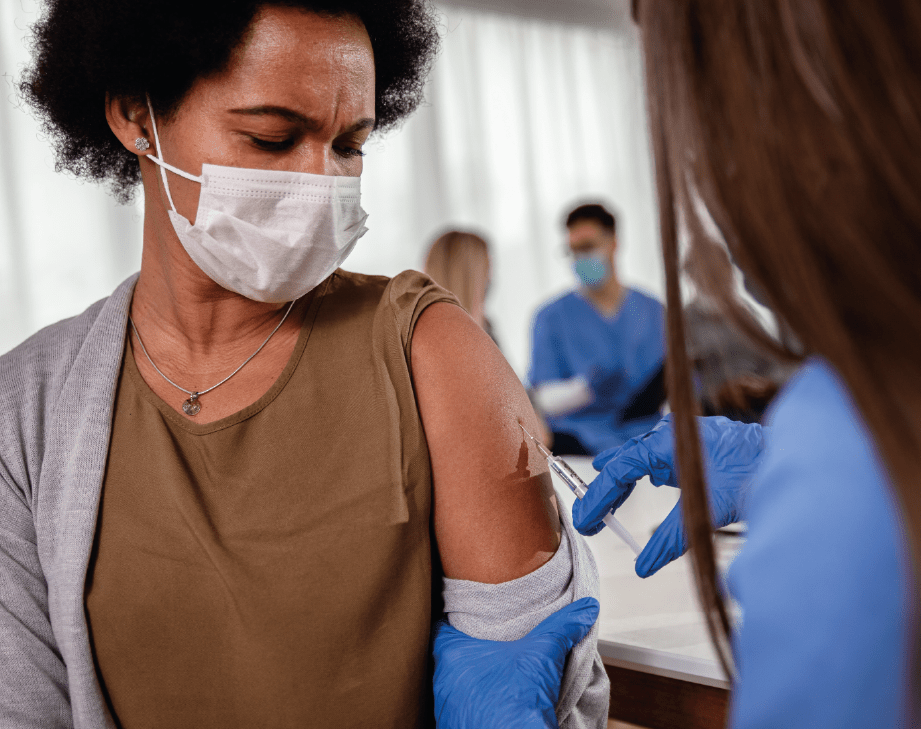

COVID-19 vaccination: Facts and fallacies
Our Chief Medical Officer, Dr Mark Simpson, explores some of the common questions he gets asked about the COVID-19 vaccination programme.
Imagine that we had no capability to vaccinate people against COVID-19 infection. Where would we be now?
Infections and deaths would still be rising inexorably, and the NHS would be struggling to treat severe cases. Waiting lists for other treatments, some of them life threatening and urgent, would still be growing.
Continuing lockdown and social restrictions would be causing children's education to suffer, while a failing economy would be leading to further job losses and our mental health would be getting poorer.
We have heard the hackneyed phrases 'world beating' and 'game changing' many times over the past 12 months. However, the UK vaccine programme really does, for once, live up to this billing.
So, let's address the main questions people are asking.
» Is it safe?
Extensive clinical trials were carried out, and all the results were very carefully assessed and reviewed by the Regulatory Authorities in the UK (MHRA) and the EU (EMA) before licensing was granted.
More than 18 million doses of the Pfizer and AstraZeneca vaccines have been given in the UK, with no reports of major side-effects.
Minor side-effects such as pain at the injection site, chills and aches have been reported, but have generally settled within 24-48 hours - especially with the help of paracetamol and ibuprofen.
There has also been no evidence to suggest that age or ethnic group make you more likely to suffer side-effects.
» Is it effective?
When Covid vaccine research started in January 2020, it was hoped that it would be possible to find one that was 50%effective – about the same as the annual flu jab.
We are lucky that the results have far exceeded this, with levels of around 85%efficacy after one dose - and 95 per cent after the second dose.
These figures are now being confirmed in real-life trials, looking at hospital admissions and the risk of infecting another person. A recent study in Scotland showed a 90%reduction in people being admitted to hospital, four weeks after they received their first jab.
» Can I stop infecting others with COVID-19?
We knew that vaccination hugely reduced the chance of falling seriously ill, but we were not sure what effect it would have on transmission of the virus.
Thankfully, it now seems highly likely that it reduces - but I should stress, does not eliminate - this risk as well. A study by Public Health England showed a 70% prevention of both asymptomatic and symptomatic cases.
We will need to wear masks and keep social distancing for the time being, but household infections will fall as more people are vaccinated.
» Is there anything in the vaccine that I should be worried about?
I can categorically state that the vaccine does not contain:
- Beef or pork products, or meat
- Alcohol
- Foetal material
So, the vaccine should be acceptable to all faith groups.
» What are the myths are there about the vaccine?
Due to the power and reach of social media and the internet, the answer is endless. However, as an example:
- It does not contain a microchip
- It does not alter your DNA
- It does not cause other diseases or infections
» Are there any medical reasons not to have the vaccine?
At the moment, the main contra-indications are current pregnancy and a history of severe vaccine allergy.
Some pregnant women with significant underlying health conditions may be at very high risk of COVID-19 complications. They are likely to be advised on a case-by-case basis.
People with severe allergy may be able to have the jab at specialist centres, which are equipped for dealing with allergic reactions.
People suffering from bleeding disorders, or who are very immunosuppressed, should discuss the matter with their specialist.
If you are attempting pregnancy or breastfeeding it is perfectly safe to have the vaccine.
» Does it hurt?
You can expect to feel a momentary pin-prick sensation. For those of you who have had a flu jab, it is almost exactly the same.
I understand people's fear of needles, but the jab really is virtually painless.
» Have you had the vaccination?
Yes. I received a text from my GP surgery and made an appointment on the link provided. It did not tell me which vaccine I was having - and I would have been grateful to have either.
The whole process was very efficient and it was great to see the team spirit and camaraderie of those staffing the vaccination centre.



